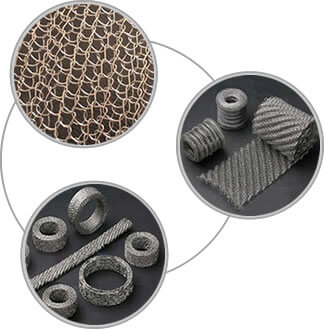Knitted wire mesh comes in different types based on the shape of the wire and the configuration of the loops. Each type has its own characteristics and is suitable for specific applications. Here are descriptions of some common types of knitted wire mesh:
Single Knitted Mesh: Single knitted mesh consists of a single layer of interlocking loops. It is flexible, lightweight, and offers excellent permeability. The wire is knitted in a zigzag pattern, creating an open and porous structure. Single knitted mesh is commonly used for applications such as filtration, separation, gas-liquid contacting, and noise reduction.
Double Knitted Mesh: Double knitted mesh is composed of two layers of interlocking loops. It provides higher strength, stability, and structural integrity compared to single knitted mesh. The two layers are knitted together, resulting in a denser structure with improved resistance to deformation. Double knitted mesh is suitable for applications that require higher mechanical strength and robustness, such as protective barriers, reinforcement, and heavy-duty filtration.
Multi-strand Knitted Mesh: Multi-strand knitted mesh is created by simultaneously knitting multiple wires, typically three or more, together. This type of mesh offers increased density, strength, and durability. Multi-strand knitted mesh is often used in demanding applications that require enhanced mechanical properties, such as high-pressure filtration, gasketing, seals, and vibration damping.
Compressed Knitted Mesh: Compressed knitted mesh is made by compressing the knitted structure to reduce its thickness and increase its density. This process is achieved through heat treatment or mechanical compression. Compressed knitted mesh retains its flexibility and porosity while offering improved resistance to compression and increased surface area. It is commonly used in applications like gaskets, seals, cushioning, and catalyst support.
Customized Knitted Mesh: Knitted wire mesh can be customized to meet specific application requirements. This includes variations in wire diameter, mesh size, material, and overall dimensions. Customized knitted mesh can be tailored to provide specific filtration properties, conductivity, corrosion resistance, or other specialized characteristics.
